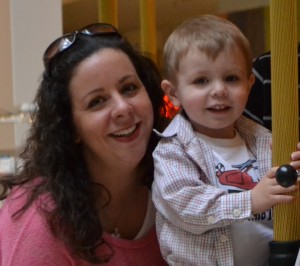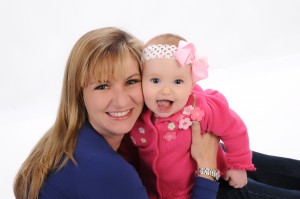Newborn Screening from a Parent's Point of View
By: Sharon Muza, BS, LCCE, FACCE, CD/BDT(DONA), CLE | 0 Comments
Earlier this week, Elizabeth Jones, APHL, shared with us the current research and information on newborn screening. In today's post, we're sharing real stories from parents of children whose lives were saved because of newborn screening. " Sharon Muza, Community Manager.

Evan and Teddi Miller © Teddi Miller
After a labor and delivery that didn't go exactly as planned (a natural birth turned cesarean section), Evan was born. His parents had strict wishes against administering any of the typical newborn routines, including vaccines or giving any formula. They did, however, choose to administer the newborn screening test, and it proved to be the most important decision they made. Evan was born with a rare genetic disorder called Maple Syrup Urine Disease. His body couldn't properly break down certain amino acids found in protein. This meant that breastmilk and typical baby formulas would put him into a coma, cause seizures, brain damage, and eventually kill him if left undiagnosed. Within a week, a child born with MSUD that goes undiagnosed is usually in a coma. Within two weeks, they may not be alive. Newborn screening " that little poke in the bottom of his heel " allowed him to be diagnosed and treated before he had any brain damage or seizures. He was able to receive medical formula void of amino acids to keep the amino acids from poisoning his body. Evan is now just over two years old. He has no brain damage and is developmentally on par with his peers. Read more about Evan's story here: Evan's Greatest Gift
Maggie

Trish and Maggie Cook © Trish Cook
Days after she was born, Maggie was rushed to the NICU. Her temperature was too low, she wouldn't eat and couldn't stay awake. Her parents watched their cherub-like angel shrivel into a little grey sickly looking baby, and there wasn't anything anyone could do about it. Luckily, the neonatal pediatrician was familiar with the conditions babies are screened for at birth, and began to suspect that Maggie was suffering from one of the metabolic disorders. She was immediately on the phone demanding that Maggie's newborn screening results be rushed. That phone call may have saved Maggie's life. It was determined that Maggie was born with a rare disease called isovaleric acidemia (IVA). Every 1 in 250,000 babies is born with it. She is unable to properly metabolize protein and if she eats foods (including breastmilk) that contain protein the result is a buildup of toxins that attack her brain and other vital organs. Had she not been diagnosed via newborn screening " and had that neonatal pediatrician not acted so quickly " her mother would have continued to unknowingly poison Maggie with her breast milk. She is now a very happy, healthy girl and her disease is very manageable. Read more of Maggie's story here: A Pediatrician's Quick Thinking Saved Maggie Grace.
Alena
Walking back from the nursery to her room, Beate picked up a pamphlet on newborn screening, a routine test that was not familiar to her. The next day they packed their bags, buckled their new baby girl, Alena, into her carseat and prepared to leave the hospital as a new family of three. Beate remembered that pamphlet and asked the nurse if Alena had been screened. The nurse scanned her chart and realized the test had been forgotten, so she took Alena to quickly prick her heel and gather the necessary samples. Beate and her family then headed home. During her first week at home, Alena wasn't eating much and what she did eat immediately came back up. Something didn't seem right to Beate or their pediatrician. During a trip to the emergency room, the newborn screening results came back " Alena had galactosemia, a condition that kept her from processing galactose (sugar) and if left untreated could cause damage to her liver, brain, kidneys, and eyes. What if she hadn't asked about that newborn screening test that was accidentally forgotten? Luckily, she'll never have to know. A few years later, Alena became a big sister to Mia Rose who was also born with galactosemia. Read more about their story here: How Newborn Screening Saved Two Little Girls.
Caroline
Jana was thrilled when her daughter, Caroline, decided that she wanted to play softball this past spring! Caroline was born with isovaleric acidemia (IVA), a condition that keeps her from processing the amino acid leucine. Fortunately, newborn screening caught Caroline's condition and she is a typical rambunctious 10 year old girl. Her brother Stephen was not so lucky. Born years before his sister, Virginia had not yet begun screening for IVA. Stephen appeared to be a normal growing boy for the first three and a half years of his life; one morning as his mother went to wake him, she found a limp unresponsive boy. The diagnosis of IVA came too late to prevent severe brain damage. As Jana said, "Stephen and Caroline are a clear representation of the importance of newborn screening and the dramatic consequence with and without." Read more about their story here: Two Siblings Born With Isovaleric Acidemia: One Caught by Newborn Screening, One Wasn't.
While these genetic disorders are rare, clearly identifying them early is critical and important. Being an informed childbirth educator with accurate and current resources to share with your class is very important. What questions have you had from parents on the newborn screening? Have you had a family with their own story to tell?
Published: July 17, 2013
Tags
Childbirth educationInformed ConsentNewborn ScreeningNewbornsMaternal Infant CareBabiesBlood Test